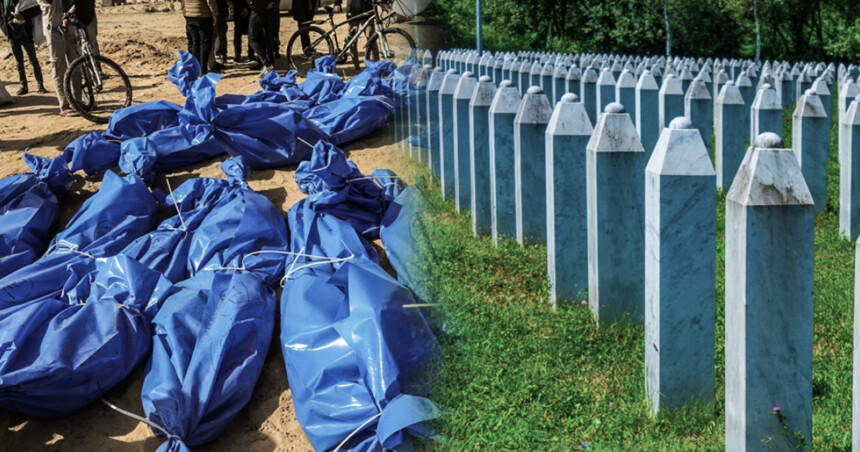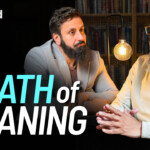July marked the 30th anniversary of the Srebrenica genocide, a crime that remains the worst massacre in Europe since World War II. The remains of many victims are still being recovered and identified, decades after they were thrown into mass graves. What makes this even more painful is that it was carried out against Muslims.
Bosnia represents, in many ways, the farthest point in Europe that Islam took root. For centuries, the lands of Bosnia existed within the Uthmani Khilafah, and Islamic civilisation left its mark on everything from the architecture of its mosques to the rhythm of daily life, to the very identity of its people.
And yet, despite this deep Islamic heritage, Bosnia became the site of one of the most brutal campaigns against Muslims in modern history.
For a younger generation of Muslims growing up today, the Bosnian War is often a distant memory — something they may have heard about in passing, but never truly understood.
Questions remain:
- What was the war really about?
- Why exactly were Muslims targeted?
- Why does it matter to us — here and now?
The Other Archive
The fact that the war is still within living memory is a measure of its nearness in history.
30 years on, many of those who survived as victims, fighters, aid workers, and journalists are alive. Their stories exist across the Internet, in documentaries, and scattered in archives and books, but what is often missing is the Muslim perspective on Bosnia told from within our own communities.
For Muslims in the UK, Bosnia was a conflict that sparked outrage, grief, mobilisation, and in some cases life-changing decisions. They raised funds, delivered aid, campaigned, and some even travelled to Bosnia themselves — whether as humanitarians or fighters.
And yet, little exists today that captures this perspective. For our children and their children, there is a danger that this history will be left out, erased, or remembered only through the lens of others!
Small contribution to the Ummah’s memory
The series is an attempt to preserve a portion of history, a contribution to the living library of the Ummah.
Across eight episodes, I spoke to historians, analysts, aid workers, activists, and fighters. We explored the deeply personal stories and reflections of those who lived through it.
Some of the guests are well known, such as Moazzam Begg and Babar Ahmad. And there are other equally vital voices: journalists like Haris Tagari, my Serbian friend George, or Imams like Abu Bilal Sanel Haskić, who continue to connect Bosnian heritage with Muslim identity today.
I feel that another thread has been added to a narrative with the inclusion of each voice; I hope future generations will turn to this narrative in their search to understand both Bosnia and themselves.
Why audio only?
When deciding how best to tell these stories, I turned to podcasting for a reason. Audio storytelling is intimate. It leaves listeners with no choice but to hear the emotion in a voice, the pauses between words, and the silences where memory itself seems to speak. The stories are told as they are.
We’re in an age of short-form soundbites and endless scrolling, so podcasts demand patience and reflection. Their long-form nature makes space for nuance and emotional resonance that short-form content cannot match.
As a good uncle of mine reminded me,
Make long-form. Don’t worry, we shouldn’t always play to the lowest common denominator.”
This work was also informed by my own academic research into cultural memory, sound, and Muslim identity. I believe podcasts are a way to carve out space for underrepresented voices; a medium that doesn’t require mainstream approval to be heard. In this sense, The Other Archive is about reclaiming and recording Muslim narratives that might otherwise be lost.
Bosnia, the Uthmani Khilafah, & Europe
The story of Bosnia cannot be told without remembering its centuries under the Uthmani Khilafah.
Islam arrived in the region in the 15th century and, under Ottoman rule, Balkan Muslims lived side by side with Orthodox Christians and Catholics. Sarajevo became known as the “Jerusalem of Europe”.
After the collapse of the Khilafah, the Balkans were left vulnerable. By the 1990s, a whole new story unfolded.
This is why remembering Bosnia matters. It is not simply about one war. It is about Europe’s long and often hostile relationship with Islam and Muslims. A relationship that has resurfaced in new forms today.
Bosnia still forces us to confront questions that remain urgent:
- What does it mean to be a Muslim in Europe?
- What happens when assimilation is demanded but dignity is denied?
- Can we trust the European states to protect us when history has shown otherwise?
Assimilation has failed. Under Islam, we can spend centuries in a land and enrich it. Without Islam, we very quickly face dehumanisation when the political scale shifts.
For Muslims in Europe today, the Bosnia story is a warning not to fall for the traps of assimilation, nor to pin our hopes on other people and their way of life as a safeguard.
Our strength lies in our connection to the Ummah, beyond borders, and in preserving, propagating, and implementing our Islamic way of life unapologetically.
Bosnia and Gaza, the mirrors of our time
The urgency of Bosnia’s lessons could not be clearer than in our present moment.
As the genocide in Gaza continues to unfold before our eyes, we see haunting echoes of Bosnia. The world watches despite saying “never again”. Western governments continue to support the genocide. People are dehumanised, and the language of “collateral damage” masks the reality of ethnic cleansing.
We see that inaction kills. That is when Muslims are dehumanised and such atrocities can unfold in plain sight. And we see that only by uniting the Ummah can we hope to resist.
The Ummah
At its core, Untold Stories: The Bosnia Series is about connecting the present and shaping the future.
The stories in this series are reminders of our unity, that the Ummah is one body, that the struggles of Muslims in Bosnia are inseparable from those of the Muslims in Palestine, East Turkestan, or Kashmir. By remembering Bosnia, we are equipping ourselves with lessons to build a better future.
My hope is that this series will serve as a bridge between generations, communities, and lands. That it will, inshāAllah, inspire young Muslims in Europe and beyond to see themselves as part of an Ummah, with responsibilities that extend far beyond borders.
The episodes
| Episode | Title | Description |
|---|---|---|
| 1 | The Balkans | An introduction to the region, its history, politics, and Muslim identity. |
| 2 | The War Breaks Out — Voices From Both Sides | How the war began, with reflections from Balkan Muslims and a Serbian voice. |
| 3 | News From Bosnia | How the conflict was received in the UK Muslim community. |
| 4 | From My Uncle to Moazzam Begg | Stories from my uncle and from Moazzam Begg joining the Mujāhidīn. |
| 5 | The Story of Shahid Butt | One of the earliest foreign fighters reflects on Bosnia, Afghanistan, and Yemen. |
| 6 | The Story of Babar Ahmad | Memories from Bosnia and its impact on a generation of Muslims in Britain. |
| 7 | My Bosnian Imam | A scholar and educator on faith, identity, and heritage. |
| 8 | Collection of Reflections | Final thoughts and lessons from across the series. |
Have a listen wherever you like
Untold Stories: The Bosnia Series is now available on:
Source: Islam21c







